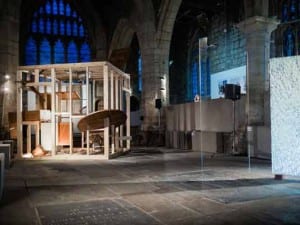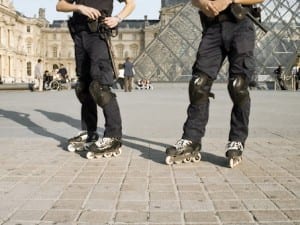Iranian-born, Melbourne based Hoda Afshar (b. 1983) has built a practice on activism, emotional depth and resilience. Her work examine the politics of image-making, forcing viewers to contend with brutality and violence in an evocative, and sensitive way. Best known for her 2018 prize-winning portrait of Kurdish-Iranian refugee Behrouz Boochani, her work has featured in exhibitions at Centre for Contemporary Photography, Museum of Contemporary Art Australia and the Monash Gallery of Art. Now, the artists presents, A Curve is a Broken Line, a new retrospective at the Art Gallery of New South Wales, Sydney. In a show that includes works from the past decade, as well as a newly commissioned series, the artist surveys the current contemporary moment, as she wrestles with the most critical injustices of today.

To create pieces such as the video artwork Remain (2018), Afshar travelled to Manus Island, Papua New Guinea, with a camera concealed under her false base in her suitcase. The artist captured the experiences of stateless asylum seekers following the closure of the infamous immigration detention centre on the island in October 2017. It’s a film that is simultaneously both confronting and hauntingly beautiful. In one instance, a male figure lies on a sandy white shore, his body lapped up by turquoise waves. In the next, a Sri Lankan Tamil refugee stands in the rainforest, recounting his experience of detainment on the island. Afshar explains, “I made the decision to not make a straightforward documentary. I believe images of refugees as poor, helpless victims tend to affirm an inferior position in the viewer’s eyes. Instead, this is an artwork that uses the language of poetry, music and performance to resist a typical narrative and logic.”

Afshar advocates the importance of individual stories, continuing this with projects such as Agonistes (2020), a film that sheds light on whistle blowers. The work is based on the experiences of former employees of the military, secret service, disability services, government agencies and youth detention centres. It retells the stories of people who have faced injustice following their decision to call out alleged abuses. The project takes the form of a 20 minute single-channel video, as well as a collection of portraits. To create the latter work, Afshar photographed each subject in 360 degrees using 110 cameras. She then printed the images with a 3D printer, before photographing each bust. The resulting portraits take on a ghostly, poised form, evoking the expressions of classical sculpture. Individual whistleblowers are made into “modern tragic figures,” as Afshar transfigures the ancient Greek world into the contemporary moment. She links the two time periods through the condition of the state, noting, “The reality of Athens at the time was a system that was rooted in patriarchy, slavery, xenophobia, refugee crisis — all of which are still the struggles of our time. The function of tragedy then was to give voice to the excluded voices.”

These are works that are delicate yet robust. Afshar compels viewers to pay attention to the dire situations of so many individuals. Here, art becomes a mode of activism. It asks audiences to question our everyday modes of governance, particularly those that come into conflict with our basic human rights. A Curve is a Broken Line is an ambitious and impressive exhibition, particularly given its status as Afshar’s first major solo show. It establishes the artist as one of Australia’s most prolific creatives working today. Crucially, it’s a display that stands up for the rights of others, making audible the voices of those who have been silenced.
Hoda Afshar: A Curve is a Broken Line | 2 September 2023 – 21 January 2024
Words: Shirley Stevenson
Image Credits:
1. Hoda Afshar Untitled #11 from the series Speak the wind 2015–22 © Hoda Afsha
2. Hoda Afshar Remain (video still) from the series Remain 2018, Art Gallery of New South Wales © Hoda Afshar
3. Hoda Afshar Agonistes (video still) from the series Agonistes 2020 © Hoda Afshar
4. Hoda Afshar Crease 2014 from the series In the exodus, I love you more 2014–ongoing © Hoda Afshar





